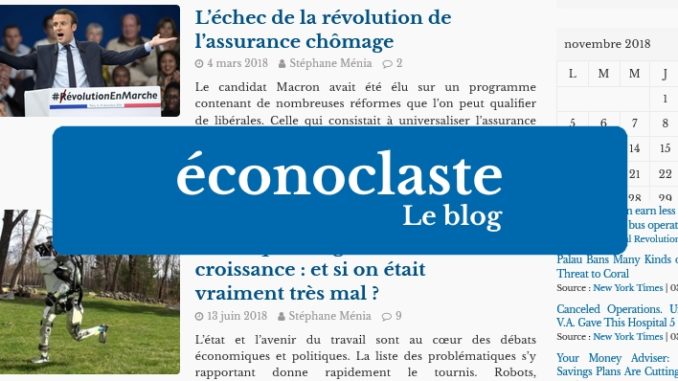
Sur les deux lauréats, cet article du NYT, qui contient des points intéressants.
Côté Sargent :
“Asked by a Nobel representative how he would deal with being certified as an economic sage in a time of global economic distress, Professor Sargent was puzzled: ‘Well, I, sorry, I don’t know what’s involved in that. You know, we’re just bookish types that look at numbers and try to figure out what’s going on,’ he said. ‘So I don’t know what to say to that!’ “
Côté Sims :
“At a news conference at Princeton, he (Sims) was asked to comment on the fiscal and financial rescue operations in the United States. ‘Answers to questions like that require careful thinking and a lot of data analysis,’ he replied. ‘The answers are not likely to be simple.’ Neither he nor Professor Sargent is accustomed to talking ‘off the top of our heads,’ he said. ‘You shouldn’t expect much from us.’ “
Moins anecdotique :
“Professor Sims doesn’t want to be pigeonholed. ‘I’m not “non-Keynesian” ‘, he said, adding that he has been an active “promoter of new Keynesian macroeconomic models,” because they “are the place in our profession where theory and data and policy decision-making are coming together.” ”
- Sur le passeport vaccinal - 18 mai 2021
- Laissez le temps de travail en paix - 19 mai 2020
- Élinor Ostrom, le Covid-19 et le déconfinement - 16 mai 2020
- Ne tuons pas l’enseignement à distance. Optimisons-le - 15 mai 2020
- Quelques commentaires sur les évaluations à l’arrache des systèmes de santé en pleine épidémie - 9 mai 2020
- Du bon usage du supposé dilemme santé vs économie - 9 mai 2020
- Le problème avec la courbe. Édition Covid-19 - 4 mai 2020
- Reprise d’activité - 21 avril 2020
- Problème corrigé sur les notes de lecture - 6 février 2020
- éconoclaste a 20 ans. Épisode 2. Passeurs dans les années 2000 - 27 décembre 2019

Une année, à Orléans, on a invité Debreu à l’Université, à grand renfort de publicité dans la presse locale. L’amphi était plein, avec des altermondialistes locaux, qui rêvaient d’en découdre avec un Nobel. La conférence était hyper technique, et le public était largué/navré. A la fin de la conférence, un sympathisant d’ATTAC demande : "qu’est ce que vous pensez de la taxe Tobin ?" Debreu est décontenancé, marque un silence et commence "James Tobin est un très bon ami. Nous avons dîné ensemble il n’y a pas longtemps. C’est un plaisir de discuter avec lui, il a souvent de bonnes idées…". "Oui, mais que pensez vous de la taxe Tobin ?". "Oh, désolé, nous n’entrons pas dans de tels détails lorsque nous discutons tous les deux…". Bref, Debreu n’avait jamais entendu parler de la taxe Tobin…
J’aime bien les Nobel d’Économie, on peut toujours trouver dans leurs anciennes interviews et autre papers des arguments pour sa chapelle. Ci-dessous pour la mienne :
In the same interview, Professor Sargent was also skeptical of President Obama’s stimulus:
Interviewer: A January 2009 article quotes you as saying, “The calculations that I have seen supporting the stimulus package are back-of-the-envelope ones that ignore what we have learned in the last 60 years of macroeconomic research.” What calculations had you seen?
Sargent: I said something like that to a reporter. I had just read an Obama administration’s Council of Economic Advisers document e-mailed to me by my friend John Taylor. I agreed with John that the CEA calculations were surprisingly naive for 2009. They were not informed by what we learned after 1945….In early 2009, President Obama’s economic advisers seem to have understated the substantial professional uncertainty and disagreement about the wisdom of implementing a large fiscal stimulus. In early 2009, I recall President Obama as having said that while there was ample disagreement among economists about the appropriate monetary policy and regulatory responses to the financial crisis, there was widespread agreement in favor of a big fiscal stimulus among the vast majority of informed economists. His advisers surely knew that was not an accurate description of the full range of professional opinion. President Obama should have been told that there are respectable reasons for doubting that fiscal stimulus packages promote prosperity, and that there are serious economic researchers who remain unconvinced.
In the same interview, Professor Sargent says, “Europe’s generous unemployment compensation system has made an important contribution to sustained high European unemployment….Our models imply that people in Europe, especially older workers, are suffering from long-term unemployment because of the adverse incentives brought about by a generous social safety net when it interacts with these human capital dynamics….if, in the United States, we create a system where unemployment and disability benefits are permanently extended in their generosity and their duration, we will inadvertently put ourselves into the situation that much of Europe has suffered for three decades.”
"If the euro wants to survive, it will have to work out a way to share fiscal burdens and connect fiscal authority to the European Central Bank (ECB) in the role of the lender of last resort",
Christopher Sims, economics professor of Princeton University, told a press conference at the university on Monday.
Les éconoclates qu’est(ce que ça vous fait de telles réactions pour qui étaient pédagogues (moi, j’ai du mal à cerner ce que dit Sargent)?